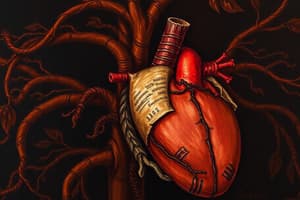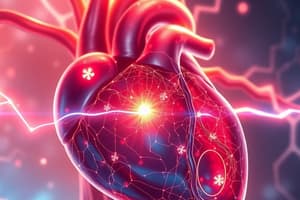Podcast
Questions and Answers
A patient taking beta-blockers reports feeling lightheaded upon standing up quickly. What is the most likely adverse effect causing this?
A patient taking beta-blockers reports feeling lightheaded upon standing up quickly. What is the most likely adverse effect causing this?
- Bradycardia and Hypotension (correct)
- Tachycardia
- Hypertension
- Bronchospasm
A patient presents to the emergency department with chest pain. After initial assessment, the physician suspects angina or NSTEMI. Which of the following medication combinations is most appropriate for initial treatment?
A patient presents to the emergency department with chest pain. After initial assessment, the physician suspects angina or NSTEMI. Which of the following medication combinations is most appropriate for initial treatment?
- Fluids and insulin
- Oxygen only
- Nitroglycerin and atropine
- Oxygen, aspirin, nitroglycerin, morphine (correct)
A patient with a history of atrial fibrillation is prescribed digoxin. What is the primary reason for using digoxin in this scenario?
A patient with a history of atrial fibrillation is prescribed digoxin. What is the primary reason for using digoxin in this scenario?
- To control heart rate in atrial fibrillation (correct)
- To treat Torsades de pointes
- To manage asthma symptoms
- To prevent STEMI
A patient is diagnosed with a deep vein thrombosis (DVT). Which medication is most appropriate for the initial treatment?
A patient is diagnosed with a deep vein thrombosis (DVT). Which medication is most appropriate for the initial treatment?
A patient with hypertension is prescribed a beta-blocker. Which of the following medications belongs to the beta-blocker class?
A patient with hypertension is prescribed a beta-blocker. Which of the following medications belongs to the beta-blocker class?
A patient is experiencing ventricular tachycardia with a pulse. Which antiarrhythmic medication is most appropriate as a first-line treatment?
A patient is experiencing ventricular tachycardia with a pulse. Which antiarrhythmic medication is most appropriate as a first-line treatment?
An elderly patient is admitted to the hospital with symptomatic bradycardia. Which medication is most likely to be administered initially?
An elderly patient is admitted to the hospital with symptomatic bradycardia. Which medication is most likely to be administered initially?
A patient received a low dose of atropine. What paradoxical effect might the nurse observe?
A patient received a low dose of atropine. What paradoxical effect might the nurse observe?
A patient with heart failure is prescribed Lasix. What type of medication is Lasix?
A patient with heart failure is prescribed Lasix. What type of medication is Lasix?
A patient with severe respiratory distress requires pain management. Which of the following conditions would contraindicate the use of morphine?
A patient with severe respiratory distress requires pain management. Which of the following conditions would contraindicate the use of morphine?
A patient taking Lasix (furosemide) reports experiencing dizziness and lightheadedness upon standing, along with muscle cramps. Which adverse reaction is most likely causing these symptoms?
A patient taking Lasix (furosemide) reports experiencing dizziness and lightheadedness upon standing, along with muscle cramps. Which adverse reaction is most likely causing these symptoms?
A patient with left-sided heart failure is experiencing severe pulmonary edema. Which combination of medications is most appropriate for managing this condition?
A patient with left-sided heart failure is experiencing severe pulmonary edema. Which combination of medications is most appropriate for managing this condition?
A patient is prescribed amiodarone for the management of a complex arrhythmia. Which ion channels are blocked by amiodarone?
A patient is prescribed amiodarone for the management of a complex arrhythmia. Which ion channels are blocked by amiodarone?
A patient with angina is prescribed nitroglycerin. What is the primary mechanism by which nitroglycerin relieves chest pain?
A patient with angina is prescribed nitroglycerin. What is the primary mechanism by which nitroglycerin relieves chest pain?
A patient is prescribed Lopressor for hypertension. What classification of medication is Lopressor?
A patient is prescribed Lopressor for hypertension. What classification of medication is Lopressor?
A hypertensive patient is prescribed Verapamil/Cardizem. What is the primary mechanism of action of these medications?
A hypertensive patient is prescribed Verapamil/Cardizem. What is the primary mechanism of action of these medications?
A patient is prescribed Aggrastat during a percutaneous coronary intervention (PCI). What drug classification does Aggrastat belong to?
A patient is prescribed Aggrastat during a percutaneous coronary intervention (PCI). What drug classification does Aggrastat belong to?
A patient with chest pain is administered morphine. What is the primary mechanism of action (MOA) of morphine in reducing chest pain?
A patient with chest pain is administered morphine. What is the primary mechanism of action (MOA) of morphine in reducing chest pain?
A patient with a history of ventricular arrhythmias is prescribed amiodarone. For which specific arrhythmias is amiodarone indicated?
A patient with a history of ventricular arrhythmias is prescribed amiodarone. For which specific arrhythmias is amiodarone indicated?
A patient is experiencing Torsades de Pointes. Which medication is most appropriate for treating this condition?
A patient is experiencing Torsades de Pointes. Which medication is most appropriate for treating this condition?
Flashcards
Adverse effects of beta-blockers?
Adverse effects of beta-blockers?
Dizziness, bradycardia, and hypotension. Beta-blockers can cause a decrease in heart rate and blood pressure.
Initial treatment for chest pain?
Initial treatment for chest pain?
Oxygen, aspirin, nitroglycerin, and morphine are commonly used in the initial treatment of chest pain associated with angina or NSTEMI.
Digoxin indications?
Digoxin indications?
Atrial fibrillation, CHF, and PSVT. Digoxin helps control heart rate and improve cardiac function.
Heparin indications?
Heparin indications?
Signup and view all the flashcards
Examples of beta-blockers?
Examples of beta-blockers?
Signup and view all the flashcards
Lidocaine classification?
Lidocaine classification?
Signup and view all the flashcards
Medications for bradycardia?
Medications for bradycardia?
Signup and view all the flashcards
Atropine low dose effect?
Atropine low dose effect?
Signup and view all the flashcards
Lasix (furosemide) is a?
Lasix (furosemide) is a?
Signup and view all the flashcards
Morphine contraindications?
Morphine contraindications?
Signup and view all the flashcards
Lasix adverse reactions?
Lasix adverse reactions?
Signup and view all the flashcards
Medications for left-sided CHF?
Medications for left-sided CHF?
Signup and view all the flashcards
Amiodarone blocks what?
Amiodarone blocks what?
Signup and view all the flashcards
Nitroglycerin's effect?
Nitroglycerin's effect?
Signup and view all the flashcards
Lopressor (metoprolol) class?
Lopressor (metoprolol) class?
Signup and view all the flashcards
Verapamil and Cardizem are?
Verapamil and Cardizem are?
Signup and view all the flashcards
Aggrastat class?
Aggrastat class?
Signup and view all the flashcards
Morphine's MOA in chest pain?
Morphine's MOA in chest pain?
Signup and view all the flashcards
Amiodarone used for?
Amiodarone used for?
Signup and view all the flashcards
Magnesium sulfate treats?
Magnesium sulfate treats?
Signup and view all the flashcards
Study Notes
Cardiac & Emergency Pharmacology
- Beta-blockers can cause dizziness, bradycardia, and hypotension as adverse effects.
- Initial treatment for chest pain related to angina or NSTEMI involves oxygen, aspirin, nitroglycerin, and morphine.
- Digoxin treats atrial fibrillation, CHF (congestive heart failure), and PSVT (Paroxysmal Supraventricular Tachycardia).
- Heparin treats DVT (deep vein thrombosis), acute coronary syndrome, and PE (pulmonary embolism).
- Metoprolol, Tenormin, and Inderal are beta-blockers.
- Lidocaine functions as a Class 1B sodium channel blocker.
- Bradycardia is treated with atropine and epinephrine.
- Low doses of atropine can cause paradoxical bradycardia.
- Furosemide (Lasix) is a loop diuretic.
- Morphine is contraindicated in patients with respiratory depression and hypotension.
- Adverse reactions to Lasix include hypokalemia, vertigo, and orthostatic hypotension.
- Medications for left-sided CHF (pulmonary edema) are Lasix, nitroglycerin, and morphine.
- Amiodarone blocks calcium, sodium, and potassium channels.
- Nitroglycerin reduces preload via smooth muscle relaxation to alleviate chest pain.
- Lopressor is a beta-blocker.
- Verapamil and Cardizem are calcium channel blockers.
- Aggrastat is a Glycoprotein IIb/IIIa inhibitor.
- Morphine acts by reducing myocardial oxygen demand via CNS suppression in chest pain.
- Amiodarone treats V-tach, PVCs, and atrial tachycardias.
- Magnesium sulfate treats Torsades de Pointes.
Studying That Suits You
Use AI to generate personalized quizzes and flashcards to suit your learning preferences.



